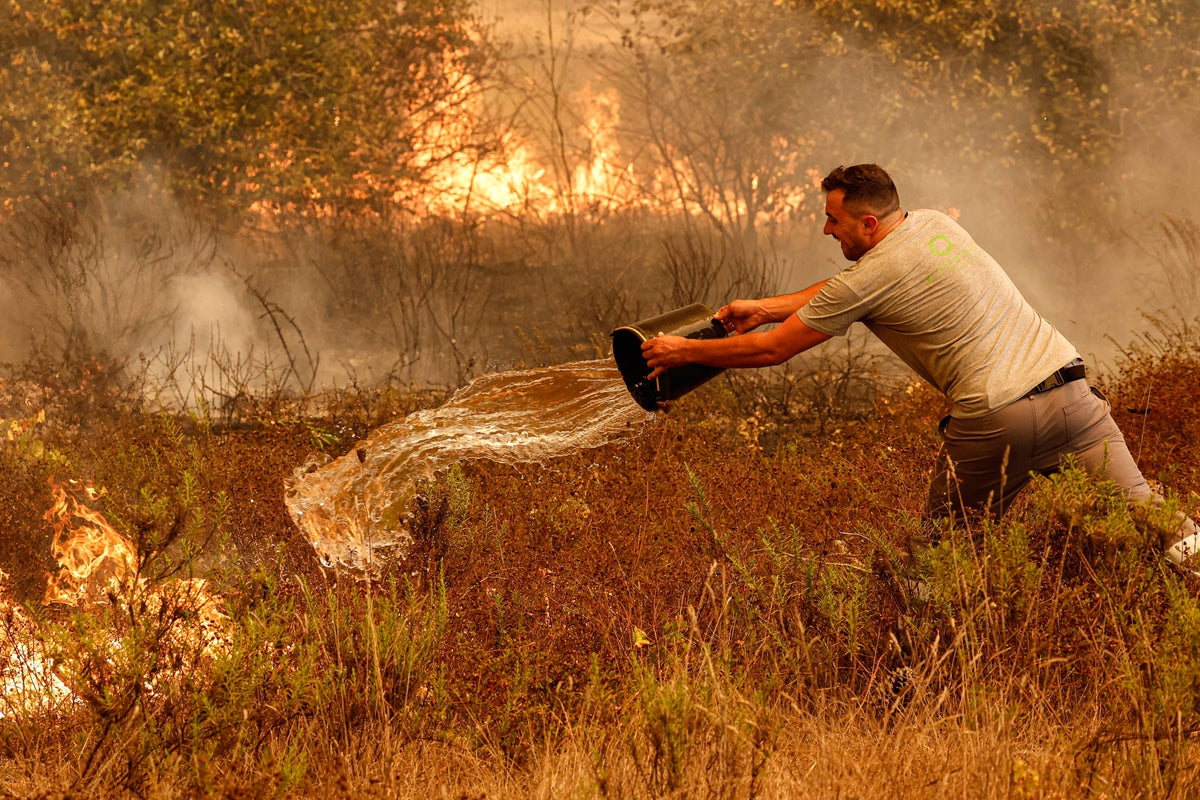
Hundreds of firefighters have scrambled to put out wildfires now raging in Portugal as temperatures topped 46C during the country’s third heatwave of the year.
The blaze began on Saturday in the municipality of Odemira, in the Alentejo region, but it has now spread south towards the Algarve.
One of the country’s most popular tourist destinations, it is currently being fought by over 800 firefighters, at least nine of whom have been injured.
The fires started in the municipality of Odemira on Saturday— (EPA)
The flames have already decimated approximately 6,700 hectares of land, with the sky in Odemira turning dark as smoke filled the air on Monday.
Have you been affected by the fires? If so email eleanor.noyce@independent.co.uk
Nineteen small villages, four tourist accommodations and a camping site have been evacuated as a precaution, with authorities confirming that blockades have been put in place across several roads.
A town and municipality in the Beja District, Odemira’s population was recorded in 2011 as 26,066. Spanning 1720.60 km², it is the largest municipality of Portugal by area. It is famous for its wild beaches.
"The weather conditions we are going to experience in the coming days means any small occurrence (fire) could become a big one," Civil Protection secretary of state Patricia Gaspar told a news conference as authorities have declared over 120 municipalities across Portugal at maximum risk of wildfires.
On Monday, Portuguese weather agency IPMA issued six red alerts for extreme heat across the country, including across the capital, Lisbon. Meanwhile, on Tuesday three districts in the country’s north were issued with the same warning as temperatures were expected to reach 41C (105.8F) in the northern city of Castelo Branco.
A firefighter airplane drops water in a wildfire in Carrascal, Proenca a Nova on 6 August— (AFP via Getty Images)
Officials warned that thousands of hectares were at risk amid soaring temperatures across the country— (REUTERS)
Forecaster AccuWeather has rated the current air quality in Odemira – where the inferno began – as poor, warning of high levels of pollution unhealthy for sensitive groups. It has advised locals to avoid going outside if they feel unwell, urging of symptoms including difficulty breathing or throat irritation.
Tuesday’s heat in Odemira is expected to reach highs of 36C, with 30C expected on Wednesday.
However, the forecast shows hope of respite elsewhere amidst the recent heat, with the Met Office forecasting highs of 29C across Lisbon and 27C in Faro on Tuesday.
On Wednesday, this is expected to dip up to 28C across both locations, with another uptick in temperature anticipated towards the end of the week. On Thursday and Friday, Lisbon is expected to reach highs of 31C and 32C, 32C and 33C in Faro.
More than 1,000 firefighters battled a wildfire in central Portugal on Sunday— (AFP via Getty Images)
Portugal’s wildfires mirror conditions seen across Europe in recent weeks— (REUTERS)
This summer, wildfires have swept across southern Europe as scientists have advised that heatwaves are becoming more frequent, intense and spread out across the seasons on account of climate change.
Portugal’s wildfires mirror conditions seen across Europe in recent weeks, with Greece, Italy and Spain struggling under a barrage of heat.
Blazes have also raged across the Mediterranean island of Sardinia in recent days, with strong winds fanning the flames and complicating efforts to keep the fires under control.
Last month, Rhodes battled intense wildfires fuelled by unpredictable winds, with a state of emergency extended across the Greek island.
The civil protection agency confirmed that the emergency status would remain in place for six months “to deal with emergencies and manage the consequences of catastrophic forestry fire.”







